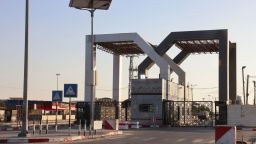Israel is denying claims it used white phosphorus munitions after the international advocacy group Human Rights Watch (HRW) accused Israeli forces of using them during military operations in Gaza and Lebanon this week.
According to a HRW report published Wednesday, the rights group said it verified one video taken on October 10 in Lebanon and another video in Gaza on October 11 that it claims shows “multiple airbursts of artillery-fired white phosphorus over the Gaza City port and two rural locations along the Israel-Lebanon border.”
White phosphorus is intended to provide illumination or to create a smokescreen in battle, but it is known to burn flesh down to the bone, according to earlier CNN reporting.
The Palestinian Ministry of Health in Gaza on Friday reported the evacuation of Durra children’s hospital in eastern Gaza after they said it was targeted by “white phosphorus bombs,” according to Dr. Ashraf Alquedra, ministry spokesperson.
Asked if Israeli forces had used white phosphorus this week in Gaza and Lebanon, the Israel Defense Forces strongly denied the claims. In a live interview earlier on Friday, IDF spokesman Lt. Col. Peter Lerner told CNN “categorically, no,” it had not.
HRW said it interviewed two individuals from the al-Mina area in Gaza City, who described seeing strikes “consistent with the use of white phosphorus” and “both described ongoing airstrikes before seeing explosions in the sky followed by what they described as white lines going earthward,” they said.
The rights group said it reviewed the video and confirmed that it was taken in the port of Gaza City and “identified that the munitions used in the strike were airburst 155mm white phosphorus artillery projectiles. Other videos posted to social media and verified by Human Rights Watch show the same location,” the group said. “Dense white smoke and a garlic smell are characteristics of white phosphorus,” the statement said.
The rights group also reviewed two videos on October 10 that occurred near the Israel-Lebanon border. “Each show 155mm white phosphorus artillery projectiles being used, apparently as smokescreens, marking, or signaling,” the release explained.
CNN has reached out for comment to authorities in Lebanon.
Is white phosphorus illegal? Under an international protocol ratified by Israel in 1995, the use of such incendiary weapons is allowed when “not specifically designed to cause burn injury to persons,” CNN previously reported.
There is no prohibition, per se, against white phosphorus in conflict. But the timing and location of its use are restricted.
For example, it is illegal under the protocol to use white phosphorus against any personnel, civilian or military. It can be directed only against military targets. International law says incendiary weapons cannot be used where civilians are concentrated.
Israel’s history with white phosphorus: Israel previously faced widespread criticism for firing white phosphorus shells over densely populated areas during a Gaza offensive that began in late 2008. HRW said in a 2009 report that Israel’s white phosphorus munitions had killed and injured civilians and damaged civilian structures, including including a school, a market, a humanitarian aid warehouse, and a hospital. HRW claimed that Israel’s use of the weapons in crowded neighborhoods “violated international humanitarian law (the laws of war), which requires taking all feasible precautions to avoid civilian harm and prohibits indiscriminate attacks.”
In response, the nation pledged to limit the use of white phosphorus and make greater efforts to protect civilians during conflicts. Still, the government said that it had used white phosphorus lawfully.










































